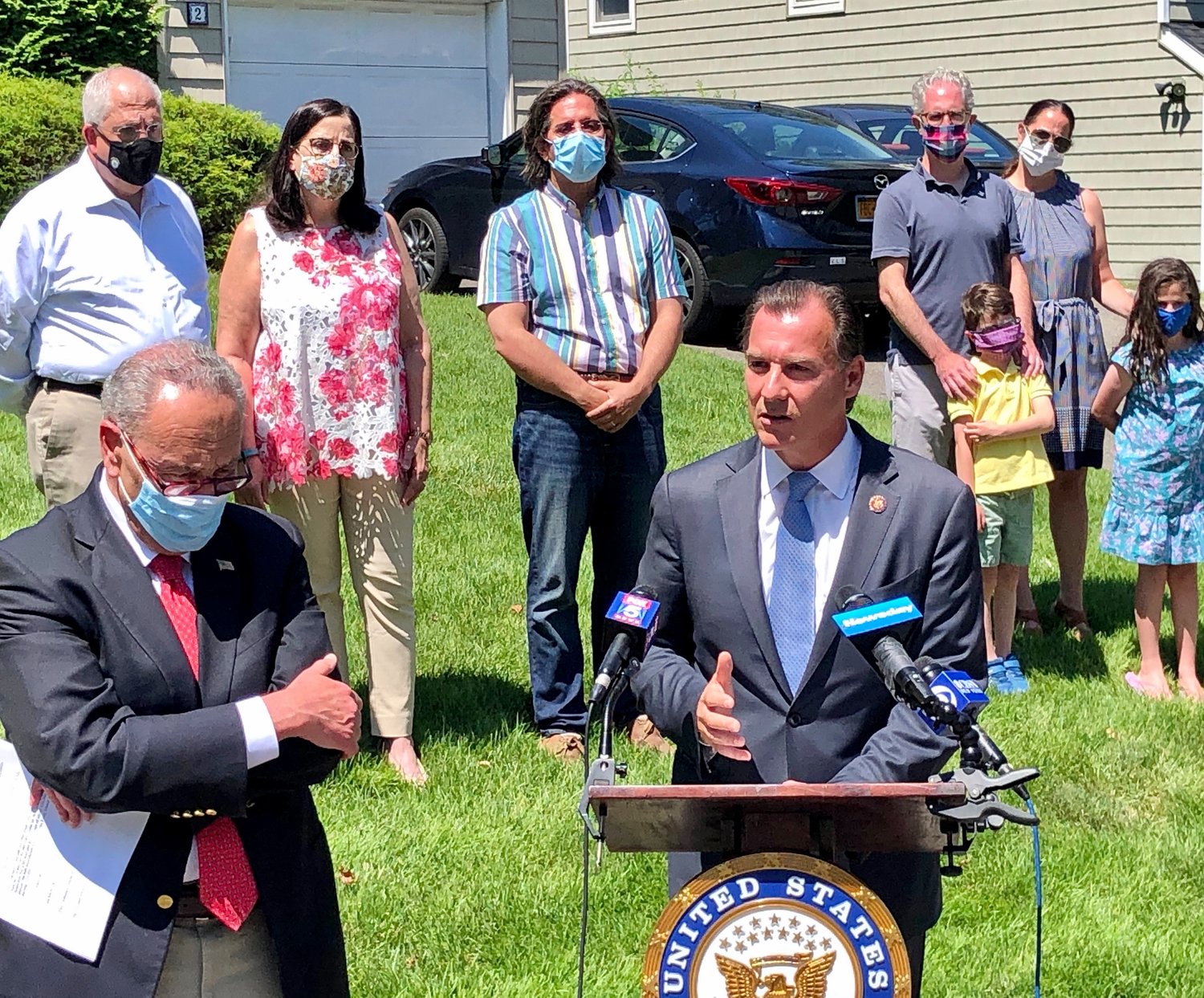Suozzi pushes for repeal of SALT cap
Schumer’s legislation would repeal SALT cap
U.S. Rep. Tom Suozzi has been fighting relentlessly to restore the full federal income tax deduction for state and local taxes, capped at $10,000 by former President Trump in his 2017 tax reform package. The SALT cap, which includes property taxes, has hit Long Islanders hard.
Senate Majority Leader Chuck Schumer introduced legislation to restore the deduction in the Senate in January, along with Suozzi, who reintroduced his House legislation, the SALT Deducibility Act. With Democrats now in control of the White House and both houses of Congress, there is a reasonable possibility that Long Island homeowners may soon see a cut in their taxes.
“The cap has been crushing to my district and all of New York,” Suozzi said. “SALT was put in place when the federal tax code was first created in the early 1900s to protect state and local governments, so they could do their taxing authority and not have to worry about the federal government coming in and taking control.”
Former U.S. Rep. Pete King was the only Republican to cosponsor a 2019 bill to repeal the SALT deduction cap, which passed in the House. It would have raised the cap to $20,000 in 2019 for married couples filing jointly, with full deductibility restored for the 2020 tax year. Then Senate Majority Leader Mitch McConnell said the bill had little or no chance of passing in the Senate, which was then controlled by Republicans, and he was right. The legislation never made it to the Senate floor for a vote.
According to the nonpartisan Joint Committee on Taxation, the wealthiest Americans would benefit the most from being allowed to write off all of their state and local taxes. And the Urban-Brookings Tax Policy Center predicts that restoring the full tax break would cost the U.S. economy about $620 billion over a decade. The center estimates that middle-income households might only see an average tax cut of $10.
Nonetheless, freshman Republican Rep. Andrew Garbarino, who now occupies King’s seat, and Suozzi see a repeal as a question of fairness. Garbarino is one of six House Republicans who cosponsored Suozzi’s bill.
“The SALT cap unfairly penalizes Long Islanders, and has [had] a devastating effect on New York,” Garbarino said. “Not being able to deduct state and local income taxes is a case of double taxation, which is the last thing my constituents need during a global pandemic.”
Suozzi said that Schumer has committed to passing SALT legislation, describing it as a priority. “Schumer is the best champion we have,” Suozzi said. “He’s the most powerful and most effective person in D.C. The fact that early on in January he has introduced a bill to restore SALT deductions is a great sign for the people of New York.”
In addition to New York, other heavily Democratic states, including New Jersey, Connecticut, Massachusetts, Illinois and California, have been hurt by the cap, Suozzi said. The creation of the cap was seen as an attack on blue states by Trump and his fellow Republicans.
Their argument — that taxes in blue states are high, and if that were not the case, capping the SALT deduction wouldn’t be an issue — is disingenuous, Democrats have said. “The objective was to knock out the blue states,” Suozzi said. “The wealthy are moving to other states . . . leaving middle- and lower-income taxpayers holding the bag to pay for school, police, fire and other essential state and local services.”
Garbarino agreed that restoring the full deduction is crucial to New York’s survival. “Long Islanders deserve to be treated fairly, and similarly to the rest of the country,” he said.
In addition to bipartisan support in the House, Suozzi’s bill is supported by many state and several national leaders, as well as the U.S. Conference of Mayors, the National Association of Counties, the National League of Cities, the International Association of Firefighters, the National Association of Realtors, the American Federation of Teachers, the National Education Association and the National Association of Police Organizations.
Timothy Denton contributed to this story.

 49.0°,
Fog/Mist
49.0°,
Fog/Mist 




